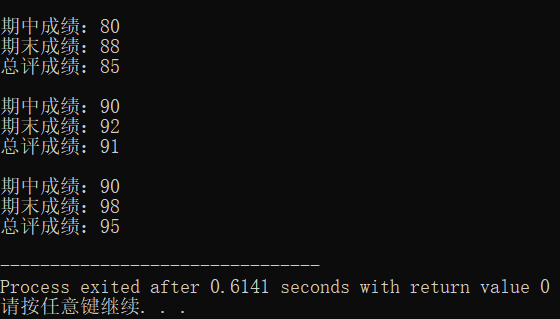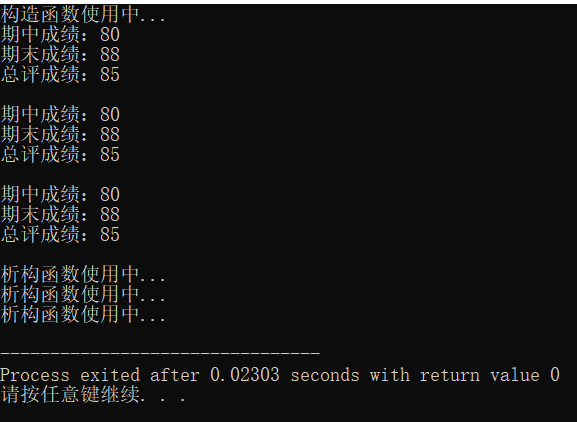第3章 【例题】(完整版)
发布时间:2024年01月04日
目录
前言
基于教材:c++面向对象程序设计(第三版)陈维兴 林小茶 编著? ? ? 第三章的所有例题
【例3.1】有关成绩结构体的例子?
//3.1有关成绩结构体的例子
#include <iostream>
using namespace std;
struct Score //声明了一个名为Score的结构体
{ int mid_exam;
int fin_exam;
};
int main()
{
Score score1;
score1.mid_exam=80;//可以在结构体外直接访问数据mid_exam
score1.fin_exam=88;//可以在结构体外直接访问数据fin_exam
cout<<"期中成绩:"<<score1.mid_exam<<"\n期末成绩:"<<score1.fin_exam
<<"\n总评成绩:"<<(int)(0.3*score1.mid_exam+0.7*score1.fin_exam)<<endl;
return 0;
}
【例3.2】使用Score类的完整程序
//3.2使用Score类的完整程序
#include <iostream>
using namespace std;
class Score{
public:
void setScore(int m,int f) {
mid_exam=m;
fin_exam=f;
}
void showScore() {
cout<<"\n期中成绩:"<<mid_exam<<"\n期末成绩:"<<fin_exam<<"\n";
cout<<"总评成绩:"<<(int)(0.3*mid_exam+0.7*fin_exam)<<endl;
}
private:
int mid_exam; //私有数据成员
int fin_exam; //私有数据成员
};
int main()
{
Score op1,op2; //定义对象op1和op2;
op1.setScore(80,88);
//调用op1的成员函数setScore(),给op1的数据成员赋值
op2.setScore(90,92);
//调用对象op2的成员函数setScore(),给op2的数据成员赋值
op1.showScore();//调用op1的成员函数showScore()
op2.showScore();//调用op的成员函数showScore()
return 0;
}
【例 3.3】一个存在错误的程序
//3.3一个存在错误的程序
#include <iostream>
using namespace std;
class Score{
public:
void setScore(int m,int f)
{
mid_exam=m;
fin_exam=f;
}
void showScore()
{
cout<<"\n期中成绩:"<<mid_exam<<"\n期末成绩:"<<fin_exam<<"\n";
cout<<"总评成绩:"<<(int)(0.3*mid_exam+0.7*fin_exam)<<endl;
}
private:
int mid_exam; //私有数据成员
int fin_exam; //私有数据成员
};
int main()
{
Score op1,op2; //定义对象op1和op2;
op1.setScore(80,88);
//调用op1的成员函数setScore(),给op1的数据成员赋值
op2.setScore(90,92);
//调用对象op2的成员函数setScore(),给op2的数据成员赋值
// cout<<"\n期中成绩:"<<op1.mid_exam<<"\n期末成绩"<<op1.fin_exam<<endl;
//从类的外部访问对象的私有成员是错误的,除非公有数据成员
op1.showScore();//调用op1的成员函数showScore()
op2.showScore();//调用op的成员函数showScore()
Score op3,*ptr;
ptr=&op3;
(*ptr).setScore(90,98);
ptr->showScore();
return 0;
}?
【例3.4】用对象赋值语句的例子?
//3.4用对象赋值语句的例子
#include <iostream>
using namespace std;
class Score{
public:
void setScore(int m,int f) {
mid_exam=m;
fin_exam=f;
}
void showScore() {
cout<<"\n期中成绩:"<<mid_exam<<"\n期末成绩:"<<fin_exam<<"\n";
cout<<"总评成绩:"<<(int)(0.3*mid_exam+0.7*fin_exam)<<endl;
}
private:
int mid_exam; //私有数据成员
int fin_exam; //私有数据成员
};
int main()
{
Score op1,op2; //定义对象op1和op2;
op1.setScore(80,88);
//调用op1的成员函数setScore(),给op1的数据成员赋值
op2=op1;
//将对象op1数据成员的值赋给对象op2
op2.showScore();
return 0;
}?
【例3.5】为类Score定义一个构造函数
//3.5为类Score定义一个构造函数
#include <iostream>
using namespace std;
class Score{
public:
Score(int m,int f);//声明构造函数Score()的原型
void setScore(int m,int f);
void showScore();
private:
int mid_exam;
int fin_exam;//私有数据成员
};
Score::Score(int m,int f)//定义构造函数Score()
{
cout<<"构造函数使用中..."<<endl;
mid_exam=m;
fin_exam=f;
}
int main()
{
}【例3.6】建立对象的同时,用构造函数给数据成员赋初值
//3.6建立对象的同时,用构造函数给数据成员赋初值
#include <iostream>
using namespace std;
class Score{
public:
Score(int m,int f);//声明构造函数Score()的原型
void setScore(int m,int f);
void showScore();
private:
int mid_exam;
int fin_exam;//私有数据成员
};
Score::Score(int m,int f)//定义构造函数Score()
{
cout<<"构造函数使用中..."<<endl;
mid_exam=m;
fin_exam=f;
}
void Score::setScore(int m,int f)
{
mid_exam=m;
fin_exam=f;
}
inline void Score::showScore()
{
cout<<"\n期中成绩:"<<mid_exam<<"\n期末成绩:"<<fin_exam<<"\n";
cout<<"总评成绩:"<<(int)(0.3*mid_exam+0.7*fin_exam)<<endl;
}
int main()
{
Score score1(80,88);//定义类Score的对象score1,自动调用构造函数
//给对象score1的数据成员赋初值
cout<<endl<<"成绩输出:";
score1.showScore();//调用成员函数showScore(),显示score1的数据
score1.setScore(90,92);
cout<<endl<<"成绩输出:";
score1.showScore();
return 0;
}

【例3.7】用成员初始化列表对数据成员进行初始化
//3.7用成员初始化列表对数据成员进行初始化
#include <iostream>
using namespace std;
class A{
public:
A(int x1):x(x1),rx(x),pi(3.14)//用成员初始化列表对引用类型的数据成员赋值
{}
void print()//rx和const修饰的数据成员pi进行初始化
{
cout<<"x="<<x<<" "<<"rx="<<rx<<" "<<"pi="<<pi<<endl;
}
private:
int x;
int& rx;//rx是整形变量的引用
const double pi;//pi是用const修饰的常量
};
int main()
{
A a(10);
a.print();
return 0;
}
【例3.8】类成员初始化的顺序
//3.8类成员初始化的顺序
#include <iostream>
using namespace std;
class D{
public:
D(int i):mem2(i),mem1(mem2+1)//是按照mem1,mem2的顺序(数据成员声明的顺序)
{ //进行初始化的。mem1先进行初始化,由于mem2还未被
//初始化,所以此时是个随机数
cout<<"mem1: "<<mem1<<endl;
cout<<"mem2: "<<mem2<<endl;
}
private:
int mem1;
int mem2;
};
int main()
{
D d(15);
return 0;
}
【例3.9】带有默认参数的构造函数
//3.9带有默认参数的构造函数
#include <iostream>
using namespace std;
class Score{
public:
Score(int m=0,int f=0);//声明构造函数Score()的原型
void setScore(int m,int f);
void showScore();
private:
int mid_exam;//私有数据成员
int fin_exam;//私有数据成员
};
Score::Score(int m,int f): mid_exam(m),fin_exam(f)//定义构造函数Score()
{
cout<<"构造函数使用中..."<<endl;
}
void Score::setScore(int m,int f)
{
mid_exam=m;
fin_exam=f;
}
inline void Score::showScore()
{
cout<<"\n期中成绩:"<<mid_exam<<"\n期末成绩:"<<fin_exam<<"\n";
cout<<"总评成绩:"<<(int)(0.3*mid_exam+0.7*fin_exam)<<endl;
}
int main()
{
Score op1(80,88);//传递两个实参
Score op2(90);//只传递了一个实参,第二个参数用默认值
Score op3;//没有传递实参,全部用默认值
op1.showScore();
op2.showScore();
op3.showScore();
return 0;
}?
【例3.10】含有构造函数和析构函数的Score类
//3.10含有构造函数和析构函数的Score类
#include <iostream>
using namespace std;
class Score{
public:
Score(int m,int f);//声明构造函数Score()的原型
~Score();//声明析构函数
void setScore(int m,int f);
void showScore();
private:
int mid_exam;//私有数据成员
int fin_exam;//私有数据成员
};
Score::Score(int m,int f): mid_exam(m),fin_exam(f)//定义构造函数Score()
{
cout<<"构造函数使用中..."<<endl;
}
Score::~Score()//定义析构函数
{cout<<endl<<"析构函数使用中..."<<endl;}
void Score::setScore(int m,int f)
{
mid_exam=m;
fin_exam=f;
}
inline void Score::showScore()
{
cout<<"\n期中成绩:"<<mid_exam<<"\n期末成绩:"<<fin_exam<<"\n";
cout<<"总评成绩:"<<(int)(0.3*mid_exam+0.7*fin_exam)<<endl;
}
int main()
{
Score score1(80,88);//定义类Score的对象Score1,自动调用构造函数,给对象Score的数据成员赋初值
cout<<endl<<"成绩输出:";
score1.showScore();//调用成员函数showScore(),显示score1的数据
score1.setScore(90,92);
cout<<endl<<"成绩输出:";
score1.showScore();//调用成员函数showScore(),显示score1的数据
return 0;//这条语句之后,析构函数自动被调用
}
【例3.11】较完整的学生类例子
//3.11较完整的学生类例子
#include <iostream>
#include<string>
using namespace std;
class Student{
public:
Student(char *name1,char *stu_no1,float score1);//声明构造函数
~Student();//声明析构函数
void modify(float score1);//成员函数,用以修改数据
void show();//成员函数,用以显示数据
private:
char *name;//学生姓名
char *stu_no;//学生学号
float score;//学生成绩
};
Student::Student(char *name1,char *stu_no1,float score1)//定义构造函数
{
name=new char[strlen(name1)+1];
strcpy(name,name1);
stu_no=new char[strlen(stu_no1)+1];
strcpy(stu_no,stu_no1);
score=score1;
}
Student::~Student()//定义析构函数
{
delete []name;
delete []stu_no;
cout<<endl<<"析构函数使用中..."<<endl;
}
void Student::modify(float score1)
{
score=score1;
}
void Student::show()
{
cout<<"姓名:"<<name<<endl;
cout<<"学号:"<<stu_no<<endl;
cout<<"分数:"<<score<<endl;
}
int main()
{
Student stu1("黎明","201502021",90);//定义类Student的对象stu1,调用构造函数,初始化对象stu1
stu1.show();//调用成员函数show(),显示stu1的数据
stu1.modify(88);//调用成员函数modify(),修改stu1的数据
cout<<"修改后:-------"<<endl;
stu1.show();//调用成员函数show(),显示stu1修改后的数据
} ?
?
可以正常运行,但编译有警告?

【例3.12】正确对数据成员赋初值
//3.12正确对数据成员赋初值
#include <iostream>
using namespace std;
class Myclass{
public:
int no;
};
int main()
{
Myclass a;
a.no=2015;
cout<<a.no<<endl;
return 0;
}?
如果将程序修改为:
//将3.12程序修改
#include <iostream>
using namespace std;
class Myclass{
public:
int no;
};
int main()
{
Myclass a;
cout<<a.no<<endl;
return 0;
}?
也许我用的是新版编译器,没有出现像书上那样的报错
实际上可以理解为调用了默认的构造函数给数据成员赋初值,默认的构造函数一般只负责给对象分配存储空间,而不承担给数据成员赋初值的任务。
但这个代码如果加上一个带参数的的构造函数一定错误。?因为:
当在类中一旦定义了带参数的构造函数,系统将不再提供无参的默认的构造函数,需要自己再重新定义一个无参的构造函数以代替默认的构造函数。
如下:
#include <iostream>
using namespace std;
class Myclass{
public:
Myclass(int no1)
{
no=no1;
}
int no;
};
int main()
{
Myclass a;
cout<<a.no<<endl;
return 0;
}编译错误提示:?

而加上一个无参的构造函数或者定义对象时给定初值就没问题了。?
【例3.13】用初始值列表初始化公有数据成员
//3.13用初始值列表初始化公有数据成员
#include <iostream>
using namespace std;
class Myclass{
public:
char name[10];
int no;
};
int main()
{
Myclass a={"chen",25};
cout<<a.name<<" "<<a.no<<endl;
return 0;
}

【例3.14】分析下列程序的运行结果
//3.14分析下列程序的运行结果
#include <iostream>
using namespace std;
class Score{
public:
Score(int m,int f);//声明构造函数Score()的原型
~Score();//声明析构函数
void setScore(int m,int f);
void showScore();
private:
int mid_exam;//私有数据成员
int fin_exam;//私有数据成员
};
Score::Score(int m,int f): mid_exam(m),fin_exam(f)//定义构造函数Score()
{
cout<<"构造函数使用中..."<<endl;
}
Score::~Score()//定义析构函数
{ cout<<endl<<"析构函数使用中..."<<endl; }
void Score::setScore(int m,int f)
{
mid_exam=m;
fin_exam=f;
}
inline void Score::showScore()
{
cout<<"\n期中成绩:"<<mid_exam<<"\n期末成绩:"<<fin_exam<<"\n";
cout<<"总评成绩:"<<(int)(0.3*mid_exam+0.7*fin_exam)<<endl;
}
int main()
{
Score score1;//定义类Score的对象score1,自动调用构造函数
score1.setScore(80,88);//给类对象score1的数据成员赋初值
cout<<endl<<"成绩输出";
score1.showScore();
return 0;
}
//当类中定义了带有参数的构造函数之后,系统将不再给它提供默认的构造函数
//解决办法:
//1. 再类中添加一个无参数的构造函数
//Score()
//{ }
//2.或在主函数中给对象参数
//int main()
//{
// Score score(80,88);
//}
?
【例3.15】构造函数的重载
//【3.15】构造函数的重载
#include <iostream>
using namespace std;
class Score{
public:
Score(int m, int f);//声明有参数的构造函数
Score();//声明无参数的构造函数
~Score();//声明析构函数
void setScore(int m,int f);
void showScore();
private:
int mid_exam;//私有数据成员
int fin_exam;//私有数据成员
};
Score::Score(int m,int f)//定义有参数的构造函数
{
cout<<"构造..."<<endl;
mid_exam=m;
fin_exam=f;
}
Score::Score()//定义无参数的构造函数
{ cout<<"构造函数使用中..."<<endl; }
Score::~Score()
{
cout<<endl<<"析构函数使用中..."<<endl;
}
void Score::setScore(int m, int f)
{
mid_exam=m;
fin_exam=f;
}
inline void Score::showScore()
{
cout<<"\n期中成绩:"<<mid_exam<<"\n期末成绩:"<<fin_exam<<"\n";
cout<<"总评成绩:"<<(int)(0.3*mid_exam+0.7*fin_exam)<<endl;
}
int main()
{
Score score1;//定义类Score的对象score1,调用无参构造函数
score1.setScore(80,88);//给对象score1的数据成员赋初值
cout<<endl<<"成绩输出:";
score1.showScore();//显示score1的数据
Score score2(90,92);//定义义类Score的对象score2,调用有参构造函数
cout<<endl<<"成绩输出:";
score2.showScore();//显示score2的数据
return 0;
}
【例3.16】计时器的实现
//3.16计时器的实现
#include <iostream>
#include<stdlib.h>
#include<string>
using namespace std;
class Timer{
public:
Timer()//定义无参数的构造函数,将seconds初始化为零
{ seconds=0; }
Timer(char* t)//定义一个含数字串参数的构造函数
{ seconds=atoi(t); }//atoi函数功能:将数字串转为整形
Timer(int t)//定义一个含整形参数的构造函数
{ seconds=t; }
Timer(int min,int sec)//定义含两个整形参数的构造函数
{ seconds=min*60+sec; }
int showtime()
{ cout<<"时间="<<seconds<<"秒"<<endl; }
private:
int seconds;
};
int main()
{
Timer a,b(10),c("20"),d(1,10);
a.showtime();b.showtime();c.showtime();d.showtime();
}
【例3.17】自定义拷贝构造函数
//3.17自定义拷贝构造函数
#include <iostream>
using namespace std;
class Score{
public:
Score(int m,int f);//声明有参数的构造函数
Score();//声明无参数的构造函数
Score(const Score &p);//自定义拷贝构造函数
//拷贝构造函数是函数名与类名相同,参数是同类对象的引用
~Score();//声明析构函数
void setScore(int m,int f);
void showScore();
private:
int mid_exam;
int fin_exam;
};
Score::Score(int m,int f)//定义有参数的构造函数
{
cout<<"构造函数使用中..."<<endl;
mid_exam=m;
fin_exam=f;
}
Score::Score()//定义无参数的构造函数
{}
Score::~Score()//定义析构函数
{ cout<<"析构函数使用中...\n";}
Score::Score(const Score &p)//自定义的拷贝构造函数
{
mid_exam=2*p.mid_exam;
fin_exam=2*p.fin_exam;
cout<<"拷贝构造函数使用中...\n";
}
void Score::setScore(int m,int f)
{
mid_exam=m;
fin_exam=f;
}
inline void Score::showScore()
{
cout<<"\n期中成绩:"<<mid_exam<<"\n期末成绩:"<<fin_exam<<"\n";
cout<<"总评成绩:"<<(int)(0.3*mid_exam+0.7*fin_exam)<<endl;
}
int main()
{
Score score1(90,92);//定义类Score的对象,调用有参构造函数
Score score2(score1);//拷贝构造函数,拷贝构造函数只在创建对象时被调用
// Score score2=score1;//作用是一样的
cout<<endl<<"成绩输出...";
score1.showScore();
// cout<<endl<<"成绩输出...";
// score2.showScore();
return 0;
}?
【例3.18】默认拷贝构造函数的调用
//3.18默认拷贝构造函数的调用
#include <iostream>
using namespace std;
class Score{
public:
Score(int m,int f);//声明有参数的构造函数
~Score();
void showScore();
private:
int mid_exam;
int fin_exam;//私有数据成员
};
Score::Score(int m,int f)
{
cout<<"构造函数使用中...";
mid_exam=m;
fin_exam=f;
}
Score::~Score() { cout<<"析构函数使用中...\n"; }
void Score::showScore()
{
cout<<"\n期中成绩:"<<mid_exam<<"\n期末成绩:"<<fin_exam<<"\n";
cout<<"总评成绩:"<<(int)(0.3*mid_exam+0.7*fin_exam)<<endl;
}
int main()
{
Score p1(80,88);//定义对象p1,调用普通构造函数初始化对象p1
Score p2(p1);//以代入法调用了默认的拷贝函数,用对象p1初始化对象p2
Score p3=p1;//以赋值法调用默认的拷贝函数,用对象p1初始化p3
p1.showScore();
p2.showScore();
p3.showScore();
cout<<endl;
return 0;
}?
【例3.19】调拷贝构造函数的三种情况用
//3.19调用拷贝构造函数的三种情况
#include <iostream>
using namespace std;
class Score{
public:
Score(int m,int f);//声明有参数的构造函数
Score(const Score &p);
void showScore();
private:
int mid_exam;
int fin_exam;
};
Score::Score(int m,int f)
{
cout<<"构造函数使用中...";
mid_exam=m;
fin_exam=f;
}
Score::Score(const Score &p)//自定义拷贝构造函数
{
mid_exam=p.mid_exam;
fin_exam=p.fin_exam;
cout<<"拷贝构造函数使用中...\n";
}
void Score::showScore()
{
cout<<"\n期中成绩:"<<mid_exam<<"\n期末成绩:"<<fin_exam<<"\n";
cout<<"总评成绩:"<<(int)(0.3*mid_exam+0.7*fin_exam)<<endl;
}
void fun1(Score p)//形参是对象,在这里调用了拷贝构造函数。
{
p.showScore();
}
Score fun2()
{
Score p4(80,88);
return p4;//renturn时,调用了拷贝构造函数,将p4拷贝倒匿名对象中。
}
int main()
{
Score p1(80,88);//定义对象p1,第1次调用普通的构造函数
p1.showScore();
Score p2(p1);//第一次调用拷贝构造函数,用对象p1初始化对象p2
p2.showScore();
Score p3=p1;//第二次调用拷贝构造函数
p3.showScore();
fun1(p1);//对象p1作为fun1()的实参,第三次调用拷贝构造函数
p2=fun2();//在哪函数fun()2内部定义对象时,第2次调用普通的构造函数
//函数的返回值是对象,第4次调用拷贝构造函数,
//但在匿名对象给p2赋值时,不会调用拷贝构造函数,函数结束时,
//匿名对象也随之消失
p2.showScore();
return 0;
}
【例3.20】分析下列程序的运行结果
//3.20分析下列程序的运行结果
#include <iostream>
using namespace std;
class Coord{
public:
Coord(int a=0,int b=0);//声明构造函数
Coord(const Coord &p);//声明拷贝构造函数
~Coord()
{ cout<<"析构函数使用中...\n"; }
void print()
{ cout<<x<<" "<<y<<endl; }
int getX()
{ return x; }
int getY()
{ return y; }
private:
int x,y;
};
Coord::Coord(int a,int b)//定义构造函数
{
x=a;
y=b;
cout<<"构造函数使用中...\n";
}
Coord::Coord(const Coord &p)//定义拷贝构造函数
{
x=p.x;
y=p.y;
cout<<"拷贝构造函数使用中...\n";
}
Coord fun(Coord p)//函数fun()的形参是对象
{
cout<<"函数使用中...\n";
int a,b;
a=p.getX()+10;
b=p.getY()+20;
Coord r(a,b);
return r;//函数fun()的返回值是对象
}
int main()
{
Coord p1(30,40);
Coord p2;
Coord p3(p1);
p2=fun(p3);
p2.print();
return 0;
}?
【例3.21】有关浅拷贝的例子
//3.21有关浅拷贝的例子
#include <iostream>
#include <string>
using namespace std;
class Student{
public:
Student(char *name1,float score1);
~Student();
private:
char *name;//学生姓名
float score;//学生成绩
};
Student::Student(char *name1,float score1)
{
cout<<"构造函数使用中..."<<name1<<endl;
name=new char[strlen(name1)+1];
if(name!=0)
{
strcpy(name,name1);
score=score1;
}
}
Student::~Student()
{
cout<<"析构函数使用中..."<<name<<endl;
name[0]='\0';
delete []name;
}
int main()
{
Student stu1("黎明",90);//调用构造函数
Student stu2=stu1;//调用默认的拷贝构造函数
return 0;
}?
【例3.22】有关深拷贝的例子
//3.22有关深拷贝的例子
#include <iostream>
#include <string>
using namespace std;
class Student{
public:
Student(char *name1,float score1);
Student(Student& stu);
~Student();
private:
char *name;//学生姓名
float score;//学生成绩
};
Student::Student(char *name1,float score1)
{
cout<<"构造函数使用中..."<<name1<<endl;
name=new char[strlen(name1)+1];
if(name!=0)
{
strcpy(name,name1);
score=score1;
}
}
Student::Student(Student& stu)
{
cout<<"拷贝构造函数使用中..."<<stu.name<<endl;
name=new char[strlen(stu.name)+1];
if(name!=0)
{
strcpy(name,stu.name);
score=stu.score;
}
}
Student::~Student()
{
cout<<"析构函数使用中..."<<name<<endl;
name[0]='\0';
delete []name;
}
int main()
{
Student stu1("黎明",90);//调用构造函数
Student stu2=stu1;//调用默认的拷贝构造函数
return 0;
}
文章来源:https://blog.csdn.net/s1ms1mpleple/article/details/135391978
本文来自互联网用户投稿,该文观点仅代表作者本人,不代表本站立场。本站仅提供信息存储空间服务,不拥有所有权,不承担相关法律责任。 如若内容造成侵权/违法违规/事实不符,请联系我的编程经验分享网邮箱:chenni525@qq.com进行投诉反馈,一经查实,立即删除!
本文来自互联网用户投稿,该文观点仅代表作者本人,不代表本站立场。本站仅提供信息存储空间服务,不拥有所有权,不承担相关法律责任。 如若内容造成侵权/违法违规/事实不符,请联系我的编程经验分享网邮箱:chenni525@qq.com进行投诉反馈,一经查实,立即删除!